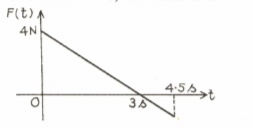G L Mittal and TARUN MITTAL Solutions for Chapter: Work, Power and Energy, Exercise 3: FOR DIFFERENT COMPETITIVE EXAMINATIONS
G L Mittal Physics Solutions for Exercise - G L Mittal and TARUN MITTAL Solutions for Chapter: Work, Power and Energy, Exercise 3: FOR DIFFERENT COMPETITIVE EXAMINATIONS
Attempt the practice questions on Chapter 10: Work, Power and Energy, Exercise 3: FOR DIFFERENT COMPETITIVE EXAMINATIONS with hints and solutions to strengthen your understanding. ISC Physics Class XI Part 1 solutions are prepared by Experienced Embibe Experts.
Questions from G L Mittal and TARUN MITTAL Solutions for Chapter: Work, Power and Energy, Exercise 3: FOR DIFFERENT COMPETITIVE EXAMINATIONS with Hints & Solutions
Two springs of force-constants and are stretched by the same force. The ratio of potential energies stored in them is:
A particle moves under the influence of a force in one dimension, where is a positive constant and is the distance of the particle from the origin. Assuming that the potential energy of the particle at the origin is zero, the graph of the potential energy as a function of will be:
Consider a rubber ball freely falling from a high height on to a horizontal elastic plate. Assume that the duration of collision is negligible and the collision with the plate is totally elastic. Then the velocity as a function of time and the height as a function of time will be:
A particle moves in the plane under the influence of a force such that its linear momentum is , where and are constants. The angle between the force and the momentum is:
The potential energy of a particle-free to move along -axis is given by . The total mechanical energy of the particle is . Its maximum velocity in will be:
A tennis ball is dropped on a horizontal smooth surface. It bounces back to its original position after hitting the surface. The force on the ball during the collision is proportional to the length of compression of the ball. Which of the following sketches describes the variation of its kinetic energy with time t most appropriately? The figures are only illustrative and not to the scale :
A block of mass is free to move along the -axis. It is at rest and from , onwards it is subjected to a time-dependent force in the direction. The varies with time as shown in the figure. The kinetic energy of the block after is :

A point mass of collides elastically with a stationary point mass of . After their collision, the 1 kg mass reverses its direction and moves with a speed of Which of the following statement is (are) correct for the system of these two masses?
